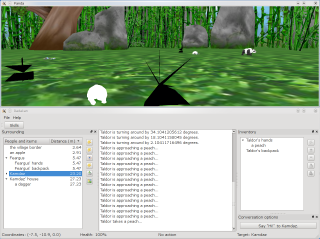Radakan
| Radakan | |
|---|---|
 User interface of Radakan | |
| Genre | RPG |
| Latest release | 0.1.0 |
| Release date | 2010-05-05 |
| Developers | Tinus and others[1] |
| Code license | GPL[2] |
| Media license | CC-BY-SA[3] |
| P. language | Python |
| Library | PyQt4 |
| Contribute | |
| Radakan is a free game. This means that the source code is available to be studied, modified, and distributed. Most projects look for help with testing, documentation, graphics, etc., as well. | |
Radakan is a single-player RPG in a unique fantasy setting, driven by a freedom-of-choice environment, with focus on true role-playing instead of combat.[4]
History[edit]
First known as The Scattered Lands, and later The Shattered Lands, Radakan had its first recruitment post on march 4, 2006, and as such it is considered the starting date of the project.[5]
On March 9, 2006 Tinus joined the team. A couple of months later, it became clear that the project lacked progressive work and leadership, and Tinus became the factual leader.
The date when Tariqwalji, a fellow programmer, joined August 16, 2006, is considered the restart of the project. Elaborate work on the design document started shortly afterwards.[6]
In early 2007 it was decided that there should be an official leader for the project: Tinus.
On March 2008, the Radakan team decided to start their codebase from scratch, applying what they had learned so far to a clean slate. They also decided to use the game engine jMonkeyEngine (Java), instating Momoko_Fan as lead programmer.
On 12th of May, Tinus resigned from the project, leaving Sadr to assume the role as project director.
In December 2008, the former Radakan team, including Sadr and MomokoFan, decided to stop developing Radakan. Tinus took over Radakan again. He downscaled the original goals to a level that he could implement everything himself, if necessary. The most striking change is the switch to Python and the new text-based user interface (no 2D, no 3D), at least, for now.[7]
On May 5th, 2010, version 0.1.0 was released.
Design[edit]
- No (typical) leveling – “Sorry, there will be no 'DING!'.” Unlike many games, Radakan doesn't use the traditional leveling model.
- Involving quests and storyline - “Sorry, collecting 10 rat tails will get you nowhere.” In Radakan there are no repetitive quests or compulsory quests that are mandatory for the player’s progress. Quests in Radakan will be a way to dig deeper into the main or side-plot, and also have an effect on the characters involved treat the player’s character from there on. Rewards will usually be involved, but not necessarily something material.
- No static «monsters» - “Sorry, killing the harpy will have consequences.” There will be what some might call monsters, but they will not be static enemies that are just there for kill&reward.
- Unique low-fantasy setting - “Sorry, there won't be any dwarves with fake scottish accents.” As mentioned in the setting section below, our setting separates itself from the typical, often Tolkien-inspired, settings with elves, orcs, dragons and the likes. “Our setting is what you might even call low-fantasy, as magic is a rarity, and even though we might "bend the rules" sometimes if it's keeping the player from having fun, we won't go far beyond the familiar boundaries of 'realism' as long as it adds to the setting and doesn't punish the gameplay.”
Features[edit]
Radakan’s special features will not be so much in special controls or fast-paced gameplay. Rather, it will be about unique interaction, and actual attachment to the characters in the player’s character surroundings.[8]
Aims[edit]
Technical (design- and programming wise)
- Advanced conversation system
- Highly interactive environment (actions with consequences)
- GUI, mainly for inventory
- NPC Behaviour
- Fake AI
Content
- An engaging story that the player will take part in and shape.
- Multiple compositions and sound-effects.
Story and Plot[edit]
Radakan doesn't have a conventional storyline, but it will have several dynamic stories.[9]
Setting[edit]
- No Elves and dwarves - The developers tried to completely avoid including cliché races such as dwarves and elves, instead focusing on completely unique fantasy races.
- Magic as a rarity - In the game universe, magic is a thing of oddity, the word hardly being spoken, and the power only used by the privileged or the lucky.
- Gods - Radakan was said to have been created by immortal beings, gods, in which the different tribes and species believe and worship.